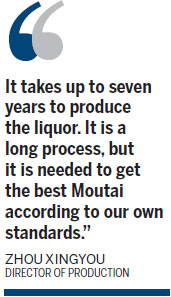
I remember when I was a kid there was an empty bottle in our home, colorful and mysterious. It was the mid-1980s in Albania and I had absolutely no idea what the bottle had contained before it ended up as a decorative item. When asked, my parents told me that we got it from my grandfather, but they wouldn't elaborate.
At that time, Albania was an isolated country and the relations with China were icy, so my parents wouldn't give any details about the bottle, fearing that as a kid I would talk to other kids, and they would talk with their parents, and problems will come along - a foreign drink bottle in our home? Big trouble.
The next time I had such a bottle in my hands again was in 2012 when I arrived in Beijing and had dinner with friends. So I had the chance to ask what was it, what was written on the label and what did the bottle have inside?
After that very first experience, there have been many other occasions that I have tasted Moutai, the famous sauce-scented brand of baijiu, or white spirit. Its name comes from the town of Maotai in Guizhou province.
The humid town smells of fermented sorghum all over. People there are proud of the liquor that is a brand name for China, not only in the country, but also worldwide.
At the distillery, everybody is busy going through all the processes of making Moutai.
Zhou Xingyou, the director of production, explained how the workers steam the sorghum, let it dry for a while and then put it in the pits where they mix it with yeast.
"You have to leave it in the pits for 30 days, take it out and repeat the process two more times. After that you put it in the distilling machines to get the liquor," Zhou said.
It is then put in barrels, where it stays for three years. After this period, experts test it to make sure everything is right. It is then aged further.
"It takes up to seven years to produce the liquor. It is a long process, but it is needed to get the best Moutai according to our own standards," Zhou explained.
In the storage room, Deng Qingqing, one of the managers, tells me that the oldest Moutai dates from late 1940s and early 1950s. The company organizes auctions from time to time to sell certain amounts of that rare liquor.
"Usually the buyers of this old liquor are collectors, who are willing to pay a lot just to have it in their collection," Deng said.
She wouldn't give exact prices, but said an 18-year-old liquor can fetch around 100,000 yuan ($16,300) per bottle, and that is only the wholesale price.
National pride
Since 1949, Moutai has been through a continuing transformation. From the time when the local State-owned factory was formed by the merger of several workshops, the legacy of is cherished by locals. One of them is Ji Keliang. He is from Jiangsu province, but has worked at Moutai since he graduated from university, so considers himself as a local. Ji is retired, but maintains a very active role in the company as the honorary chairman.
"I have seen this company progressing over the years. It used to be a small factory, but now it is a big one. Production and exports are growing every year," said Ji.
Asked about what Moutai means to the ordinary Chinese, Ji said "it is their national pride".
He added that the reason Moutai became the national liquor is due to the environment where it is produced, its special techniques and the assured quality.
Ji said Chinese leaders have played an important role on promoting Moutai. In 1949, Premier Zhou Enlai proposed that Moutai be the main liquor at state banquets.
Moutai has been an important part of the politics since then. It was served during visits by US President Nixon and Japanese Prime Minister Tanaka, as well as at Sino-British negotiations on Hong Kong when Deng Xiaoping and Margaret Thatcher toasted with Moutai.
Chinese leaders still like using Moutai to entertain guests from around the world. President Xi Jinping toasted his US counterpart Barack Obama with Moutai during his State visit in June 2013.
